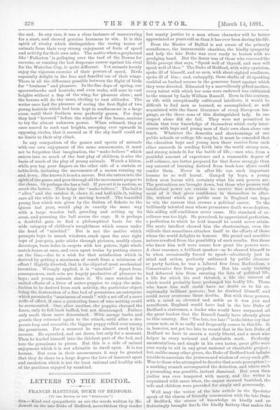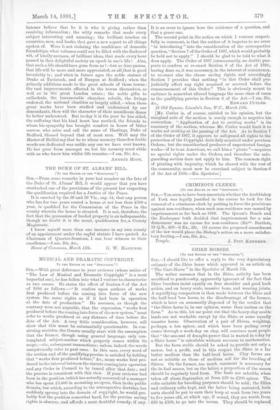LETTERS TO THE EDITOR.
FRANCIS HASTINGS, DUKE OF BEDFORD.
[To TI[};. EDITOR Or raj " SrECTATOlt."]
Sra,—Kind and sympathetic as are the words written by Mr. Jowett on the late Duke of Bedford, nevertheless they •render
but scanty justice to a man whose character will be better- appreciated as years roll on than it has ever been during his life..
Even the Master of Balliol is not aware of the princely munificence, the innumerable charities, the kindly sympathy and help the late Duke was ever ready to bestow with no• grudging hand. But the donor was of those who reversed the- Bible precept that says, " Speak well of thyself, and men will speak well of thee." The Duke of Bedford, with witty cynicism,. spoke ill of himself, and so men, with short-sighted readiness, spoke ill of him ; and, unhappily, these shafts of ill-speaking rankled as barbed arrows in the generous heart against which they were directed. Educated by a marvellously gifted mother,. every talent with which her sons were endowed was cultivated to the utmost by Lady William Russell. Even in this century, so rife with exceptionally cultivated intellects, it would be difficult to find men so learned, so accomplished, so well acquainted with the finest literature of every European lan- guage, as the three sons of this distinguished lady. In one respect alone did she fail. They were not permitted to• obtain that true knowledge of themselves which early inter- course with boys and young men of their own class alone can teach. Whatever the demerits and shortcomings of our• public schools or college life maybe, it must be conceded that the education boys and young men there receive from each other succeeds in sending forth into the world strong men, and strong minds fit for the battle of life,—men who, from a youthful amount of experience and a reasonable degree of self-reliance, are better prepared for that fierce struggle than any amount of learning derived from book-lore alone could render them. Never in after life can such important lessons be so well learnt. Gauged by boys, a young fellow soon learns with certainty what his own powers are.. The pretentious are brought down, but those who possess real intellectual power are certain to receive that acknowledg- ment of it that gives confidence in themselves in after- life, without which no public man in England can hope to win the success that crowns a political career. To the brilliantly talented man whose premature death we so deplore, this aiding self-confidence never came. His standard of ex. cellence was too high. He perceived, be appreciated perfection, a perfection to which he told himself he could never attain.. His acute intellect showed him the shortcomings, even the ridicule that sometimes attaches itself to the efforts of those whom the world delights to honour. His proud and sensitive nature revolted from the possibility of such results. But those who knew him well were aware how great his powers were.. A close reasoner, a brilliant speaker—as he showed himself to be when occasionally forced to speak—absolutely just in mind and action, perfectly unbiassed by public clamour or party faction, he was a Liberal free from Radicalism, a Conservative free from prejudice. But his early training had debarred him from entering the lists of political life, a life for which his soul thirsted, a life the interest of which would probably have prolonged his bodily life. Those who knew him well could have no doubt as to his ex- ceptionally brilliant powers ; but he doubted himself, and could never overcome those doubts. But with these powers, with a mind as elevated and noble as it was just and munificent, England would have had in the late Duke of Bedford a statesman, a leader who would have surpassed all the great leaders that the Russell family have already given to this country. But " Too late, too late !" is the bitter cry that comes now, as it so sadly and frequently comes in this life. It is, however,, not yet too late to record that in the late Duke of
we have to mourn a rarely liberal, and a most wise helper in every national and charitable work. Perfectly unostentatious and simple in his own tastes, great gifts were• ever ready to aid in any great national or charitable project ; but, unlike many other givers, the Duke of Bedford took infinite. trouble to ascertain the justness and wisdom of every such gift. Woe to those who attempted to deceive that acute perception !- a scathing remark accompanied the detection, and where such a proceeding was possible, instant dismissal. But even then justice was ever tempered with mercy, and the writer is acquainted with cases when, the unjust steward banished, the wife and children were provided for amply and generously.
Well may the writer of the late article in the Spectator speak of the charm of friendly communion with the late Duke of Bedford, the stores of knowledge so kindly and so flatteringly brought forth, the kindly flattery that makes the listener believe that he it is who is giving rather than receiving information ; the witty remarks that made every subject interesting and amusing ; the brilliant touches on .countries, men, and books, that gave a new aspect to all things :spoken of. Were it not violating the confidence of domestic friendships, what volumes could not be filled with the flashes of wit, of kindly sarcasm, of brilliant ideas, that made every hour passed in that delightful society an epoch in one's life ! Alas, that such a life should have gone from us !—but as time passes, that life will be more and more appreciated, as all:that is good invariably is ; and when in future ages the noble statues of Drake at Tavistock, and of Bunyan at Bedford ; when the princely additions made to the great schools of those towns ; the vast improvements effected in the towns themselves, as well as in the great London estate ; the noble gifts to cathedrals, the innumerable churches rebuilt, the livings endowed, the national charities so largely aided,—when these great works have been studied and understood by our :descendants, then will the character of their munificent donor be better understood. But to-day it is the poor he has aided, the suffering that his kind heart has soothed, the friends to whom his sympathy has brought comfort in hours of bitter sorrow, who arise and call the name of Hastings, Duke of Bedford, blessed beyond that of most men. Well may the Master of Balliol say that he to whose memory these few feeble words are dedicated was unlike any one we have ever known. He has gone from amongst us, but his memory must abide with us who knew him whilst life remains.—I am, Sir, &c.,
ANDIdE HOPE.



































 Previous page
Previous page